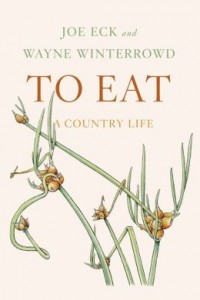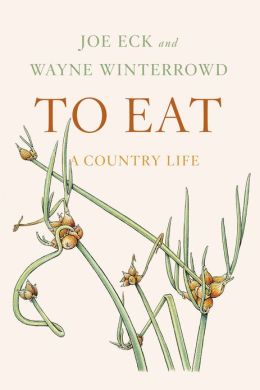 To Eat: A Country Life
To Eat: A Country Life
by Joe Eck and Wayne Winterrowd
Farrar, Straus and Giroux. 194 pages, $25.
IN EARLY 1970, when Joe Eck and his partner Wayne Winterrowd moved from Boston to Pepperell, Massachusetts, and into a 211-year-old farmhouse surrounded by wooded land and a vegetable garden, they saw myriad possibilities, and they were excited. They’d always wanted to be country gentlemen, and finding this house was a great stroke of luck. There, they discovered gardening tricks and delighted in experimenting with new crops. And they ate.
Then, after a “glorious year” in Copenhagen, the couple moved back to Boston and started a “victory garden” near the Fenway. In 1974, they moved out to a house on 28 acres of weeds and woods in southern Vermont, named their estate North Hill, and set about making gardens, arbors, and meals. They planted four different kinds of apple trees, each “near sticks” when put into the ground. Those trees yield snacks and ultimately pies and sauce. Their spinach crop was good, but not as good as what they had in Pepperell; then again, spinach is tricky. Beets were used for salads and sides; carrots were found wild and cultivated; roadside “weeds” became meals unto themselves. They grew some unusual kinds of potatoes and were happy to see their favorites become national staples.
They moved rocks, built fences, and cut furrows. They raised pigs (“Showering with a pig is not a common experience”), beef cattle, and chickens. They devoured brussels sprouts in winter, rhubarb in spring, lettuce all summer long, and onions in the fall. “No matter how excellent … the produce of your best local supermarket may be,” they say, “there is something deeply rewarding to growing your own food.”
With the circumspection of veteran gardeners and the taciturn wit of New Englanders, authors Joe Eck and the late Wayne Winterrowd share their observations about growing plants and livestock and about their life together. In starting their gardening sojourn when they did (at the end of the “Summer of Love” era) and by embracing an organic way of eating early on, their lives were “green” before green was a movement, though they reveal that they borrowed some of their ideas from old books and local lore.
There is a feeling of serenity about this book, a slowness that reminds one of front porches and barefoot afternoons, and a tone of quiet grace in a quiet place. At times, the words here are so evocative that you can almost feel the dirt beneath your fingernails and taste ripe produce, fresh from the garden. But before you might think this book is too new-agey, Eck and Winterrowd use the element of surprise, some horticulture history, and a good bit of dry humor in their stories, eliciting plenty of unexpected delight. There are subtle tips for gardeners on each page, including cautionary tales along with positive advice.
Mostly, this book is a love story about two men who each found a kindred spirit with whom to live his days while enjoying the earth and its abundance. It’s also a paean to good eating; at the end of most chapters, the authors offer recipes, both for the gourmand and for the kitchen neophyte cook.






